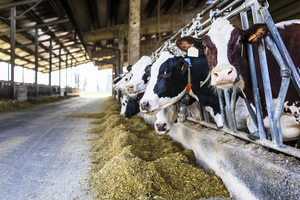With its corporate headquarters surrounded by dairy farms, U.S. Gain is personally familiar with the benefits the agricultural industry provides the local economy. Even so, U.S. Gain President Mike Koel never thought his business would be investing in these farms to produce alternative fuel. With partnerships in 12 dairy farms and growing, U.S. Gain is especially honored to see these farms profit from renewable natural gas (RNG) production.

RNG is an alternative fuel produced by capturing methane from agricultural waste, wastewater, landfills and food waste. Gas from these sources is cleaned and conditioned to meet pipeline standards, then dispensed through natural gas fueling stations and used as the only carbon-negative fuel.
According to the Environmental Protection Agency (EPA), agriculture represents about 9 percent of greenhouse gas emissions, which trap heat in the atmosphere and lead to global warming. However, the recent adoption of anaerobic digesters on dairy farms, used in part to produce RNG, reduces emissions generated by the agriculture sector. Now, instead of emitting methane and other harmful gases into the air, contaminants are captured and transformed into alternative fuel, agricultural bedding and fertilizer.
“Dairy digesters harvest methane, which is 80 percent more potent than CO2, and prevent greenhouse gases from otherwise escaping into the atmosphere,” Koel explains. “They also reduce odor by 50 percent and kill harmful bacteria such as E.coli.”
Greenhouse gas reduction strategies are a top priority for the government, as well as many other corporations and consumers. Not only does RNG provide emission reductions during development, but it also improves air quality when used as an alternative fuel. According to the EPA, transportation-related emissions comprise nearly half of the nation’s greenhouse gas emissions, which can be reduced by up to 125 percent when RNG is used for transportation fuel instead of diesel.
Environmental benefits aren’t the only gains associated with RNG. When used in transportation, RNG generates federal and regional financial credits under the Renewable Fuel Standard (RFS), California Low Carbon Fuel Standard (LCFS) and Oregon Clean Fuels Program (CFP). Credits are issued because of the strong environmental attributes associated with RNG and help position federal and regional areas to achieve outlined air quality goals.
Credit programs offered U.S. Gain the opportunity to diversify and become a vertically integrated RNG supplier. By pairing investment in agricultural RNG development with its network of natural gas fueling stations, U.S. Gain is able to obtain a higher portion of credit values and expedite the return on investment—sharing more with their partners and confidently investing in future development opportunities.
“In the past 12 months, the available supply of RNG has doubled in volume and continues to grow,” Koel says. “While this trend is positive, supply must continue to rise as demand for RNG expands beyond transportation, and into buildings and processes for carbon-free facilities and products.”

Follow us on social media: